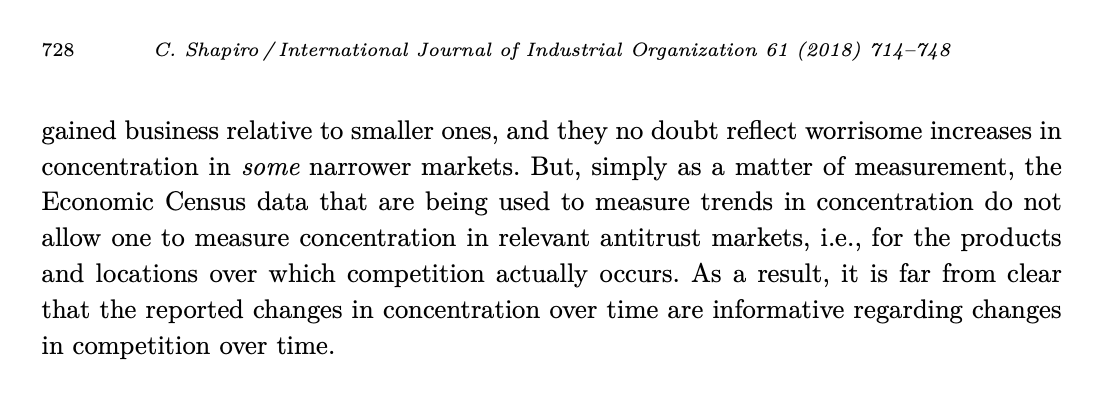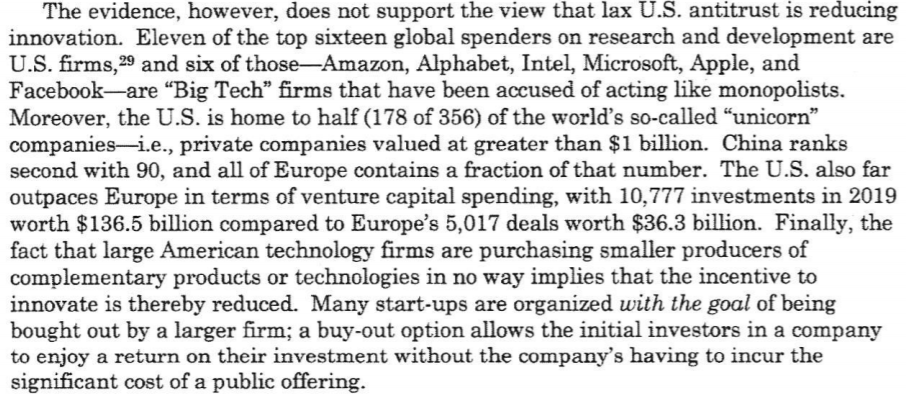All 4 big tech CEOs are testifying about #antitrust today
You’ll hear Rs complain about bias and Ds complain about social justice etc. But vague notions of “fairness” aren’t what competition law is for
There’s been a bipartisan consensus on antitrust for 40+ years. Here’s why
You’ll hear Rs complain about bias and Ds complain about social justice etc. But vague notions of “fairness” aren’t what competition law is for
There’s been a bipartisan consensus on antitrust for 40+ years. Here’s why
. @HouseJudiciary solicited top #antitrust experts for their opinion. A clear majority of these academics & former gov’t officials (from both parties) opposed major substantive changes to existing law
TF’s @AsheeshKAgarwal has summarized the comments here: https://techfreedom.org/wp-content/uploads/2020/07/TechFreedom-Summary-of-Antitrust-to-HJC-Submissions-7.2020.pdf
TF’s @AsheeshKAgarwal has summarized the comments here: https://techfreedom.org/wp-content/uploads/2020/07/TechFreedom-Summary-of-Antitrust-to-HJC-Submissions-7.2020.pdf
Among those scholars who support some changes, many support only very narrow adjustments, and even then, only if the #antitrust agencies lose in court
We’d support a number of tweaks, which we’ll explain below. But first, let’s be clear about how deep the bipartisan consensus is
We’d support a number of tweaks, which we’ll explain below. But first, let’s be clear about how deep the bipartisan consensus is
Here are the key points about today's hearing
#1: THERE’S A BIPARTISAN CONSENSUS
Top Clinton/Obama economist Carl Shapiro put it best:
#1: THERE’S A BIPARTISAN CONSENSUS
Top Clinton/Obama economist Carl Shapiro put it best:
Top Obama enforcer Bill Baer: “[F]or the last 30 years or so, #antitrust enforcement has been largely nonpartisan, driven by the widely shared view that harm to consumers and competition should be the predicate for challenging conduct. And that is a good thing.”
Former Republican FTC Cmr. @ProfWrightGMU has said the same thing
#2: THE MARKET IS WORKING
Studies suggest increased concentration stems from larger firms expanding into local markets, leading to more competition, not less.
Again, Top Clinton/Obama economist Carl Shapiro
Studies suggest increased concentration stems from larger firms expanding into local markets, leading to more competition, not less.
Again, Top Clinton/Obama economist Carl Shapiro
The assertion that innovation is down in the U.S. is not supported by the evidence: out of the top 16 spenders on R&D globally, 11 are U.S. firms
And 5 of those are the “Big Tech” companies under scrutiny today.
And 5 of those are the “Big Tech” companies under scrutiny today.
#3: VAGUENESS=POLITICIZATION
The consumer welfare standard is objective and requires sound economic analysis. This helps prevent politicization of #antitrust because a subjective fairness standard gives politicians & agencies more discretion and can easily be abused.
The consumer welfare standard is objective and requires sound economic analysis. This helps prevent politicization of #antitrust because a subjective fairness standard gives politicians & agencies more discretion and can easily be abused.
Rewriting antitrust to have multiple, vaguely defined goals (e.g., fairness) would let enforcers condemn or acquit a firm according to their own political whims. It would encourage firms to curry favor with agencies and allow for antitrust laws to be used to attack rivals.
While problems involving privacy, workers’ interests, and the democratic process may indeed exist due to Big Tech, #antitrust isn’t the cure-all
These concerns are more appropriately dealt with in other areas of law (where the constitution permits)
These concerns are more appropriately dealt with in other areas of law (where the constitution permits)
#4: VERTICAL INTEGRATION IS GENERALLY GOOD
The last 50 years have shown that vertical integration incentivizes investments, provides benefits for the acquired firm, produces lower costs and better outcomes for consumers, and is typically pro-competitive
The last 50 years have shown that vertical integration incentivizes investments, provides benefits for the acquired firm, produces lower costs and better outcomes for consumers, and is typically pro-competitive
Acquisitions are often investors’ and founders’ ideal outcome, and limiting acquisitions could chill innovation as well as investments in startups; entrepreneurs would be discouraged from building startups if they can’t realize financial returns on their investments
#Antitrust guru Herbert Hovenkamp: “merger policy should not be designed to go after large size for its own sake. It needs to rest on sound economic theory about when mergers lead to lower output and higher prices”
#5: EVEN SEEMINGLY SMALL PROCEDURAL CHANGES COULD RESHAPE ANTITRUST LAW
#Antitrust must avoid heavy presumptions against business conduct and per se rules
These de facto regulations would undermine the competitiveness and productivity of the US economy
#Antitrust must avoid heavy presumptions against business conduct and per se rules
These de facto regulations would undermine the competitiveness and productivity of the US economy
#6: AVOID TURNING ANTITRUST INTO REGULATION
Likewise, statutory rules based on ex ante conduct threaten ossification and significant error costs. Creating an agency to oversee competition in digital markets risks agency capture and entrenchment of incumbent firms.
Likewise, statutory rules based on ex ante conduct threaten ossification and significant error costs. Creating an agency to oversee competition in digital markets risks agency capture and entrenchment of incumbent firms.
Prohibiting a platform from also serving as a competing merchant on its own platform would force retailers to choose between offering house brands and third party products - greatly reducing consumer choice, as fmr FTC Cmr @M_Ohlhausen notes
#7 WORKABLE REFORMS:
Best place to start: Improve how DOJ & FTC work together to enforce existing law, as Deb Garza, former DOJ Antitrust czar who chaired the Antitrust Modernization Commission, proposes:
Best place to start: Improve how DOJ & FTC work together to enforce existing law, as Deb Garza, former DOJ Antitrust czar who chaired the Antitrust Modernization Commission, proposes:
But we need to give the agencies a chance to apply new vertical rules in the tech industry, as Prof @DanielDancrane, leading antitrust scholar, notes
#8: "SELF-PREFERENCING" ISN'T INHERENTLY BAD
Platforms have an economic incentive to be open and to invite complementors onto their service. At the same time, self-preferencing ensures enough revenue for platforms to grow and innovate.
Platforms have an economic incentive to be open and to invite complementors onto their service. At the same time, self-preferencing ensures enough revenue for platforms to grow and innovate.
There's no observable short-run harm to self-preferencing. The platform merely replaces an independent offering with its own
Successful platforms exert control over their services where doing so matters most and protects consumers but provide openness where control matters least
Successful platforms exert control over their services where doing so matters most and protects consumers but provide openness where control matters least
Forcing large platforms to provide access to all third parties, some of whom are competitors, would hamstring their ability to police their own services and to keep out harmful content - ultimately harming consumers and broader societal interests.
Self-preferencing doesn't fit into any well-received #antitrust paradigm. Facebook’s restriction on access to its API, or Amazon’s condition that merchants purchase its fulfillment services to access certain features, do not qualify as antitrust violations.
#9: MANY PROPOSED CHANGES WILL UNDERMINE  TECH DOMINANCE TO THE BENEFIT OF
TECH DOMINANCE TO THE BENEFIT OF 
@CFR_org: China is closing the technological gap with the us
@Brookings: America could fall behind China in areas like artificial intelligence and 5G.
 TECH DOMINANCE TO THE BENEFIT OF
TECH DOMINANCE TO THE BENEFIT OF 
@CFR_org: China is closing the technological gap with the us
@Brookings: America could fall behind China in areas like artificial intelligence and 5G.
As @profthomlambert explains, existing #antitrust law has allowed American companies to lead the world in tech
Tech firms prefer the US over China because of our stable legal environment and our transparent, flexible, and hospitable approach to business, as former FTC Chairman Tim Muris explains
Law Profs Harry First and Elizabeth Fox: “The EU and China eloping their own plans on how to control Big Tech as well as how to compete through big tech.”
Dem Sen @MarkWarner: if regulators “chop off the legs of Facebook and Google,” those companies “might be replaced by Alibaba, Baidu, Tencent—companies that are totally enmeshed with the Chinese government in their global economic plan"
Dem @RepRoKhanna: “Look, what we don't want is the only big tech companies to be Chinese—Alibaba, Baidu and Tencent.”
Dem @RepRoKhanna: “I don’t think competition with China means, in any way, that we give tech a pass from #antitrust enforcement . . . What it does mean is that we need to be nuanced and strategic in how we strongly enforce antitrust law and not reflexively call for breakups”
#10: POLITICAL BIAS ISN'T AN ANTITRUST PROBLEM
Media companies, new and old, aren't immune from #antitrust enforcement but it has to be based on economic harm, not the exercise of editorial discretion protected by the First Amendment
Here's why in a : https://techfreedom.org/wp-content/uploads/2018/09/Letter_-to-Jeff-Sessions-re-Social-Media-Bias-v2.pdf
: https://techfreedom.org/wp-content/uploads/2018/09/Letter_-to-Jeff-Sessions-re-Social-Media-Bias-v2.pdf
Media companies, new and old, aren't immune from #antitrust enforcement but it has to be based on economic harm, not the exercise of editorial discretion protected by the First Amendment
Here's why in a
 : https://techfreedom.org/wp-content/uploads/2018/09/Letter_-to-Jeff-Sessions-re-Social-Media-Bias-v2.pdf
: https://techfreedom.org/wp-content/uploads/2018/09/Letter_-to-Jeff-Sessions-re-Social-Media-Bias-v2.pdf

 Read on Twitter
Read on Twitter










